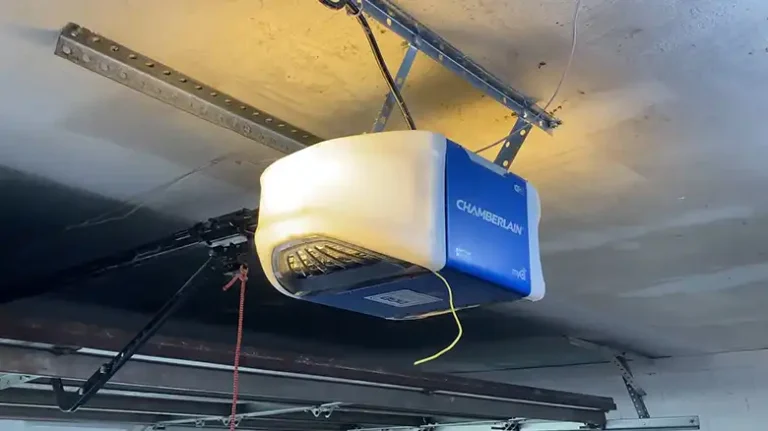[Explained] Does a Garage Door Opener Need a Dedicated Circuit
If you’re a homeowner or someone planning to install a garage door opener, you’ve probably wondered whether it needs a dedicated circuit. Well, it will depend.
Most of the time, a garage door opener doesn’t need a dedicated circuit but there are a few scenarios when you may need to install one. Seems confusing right? Then there is nothing to worry about as we are here to clear up your confusion regarding your query.
In this article, we’ll dive into the ins and outs of garage door opener electrical requirements to help you understand when a dedicated circuit is necessary and when it isn’t.

Is a Dedicated Circuit Mandatory for the Garage Door Opener
In most cases, having a dedicated circuit for your garage door opener is not mandatory, but it’s highly recommended for several reasons. A dedicated circuit means that the electrical circuit exclusively serves your garage door opener, ensuring it doesn’t share power with other appliances or outlets in your home. This setup provides several advantages, but there are situations where you can get away without one.
When It Is Mandatory
1. Heavy Usage
If you frequently use your garage door opener throughout the day, a dedicated circuit is essential. Heavy usage can strain the electrical system, and without a dedicated circuit, you risk tripping the breaker. Simply put, if your garage door draws more than 1200 watts then according to the National Electrical Code, you will need a dedicated circuit.
2. Older Homes
Older homes often have electrical systems that may not handle the additional load of a garage door opener efficiently. In such cases, a dedicated circuit becomes crucial to prevent electrical issues.
Basically, older homes’ ceiling receptacles aren’t protected by GFCI receptacles. In that, you will require a dedicated circuit
3. Multiple Openers
If you have multiple garage door openers, it’s wise to install dedicated circuits for each. This prevents simultaneous operations from causing overloads.
When It Isn’t Mandatory
1. Occasional Use
If you use your garage door opener sparingly, such as once or twice a day, sharing a circuit with other light loads may not be problematic.
2. Newer Homes
Newer homes often have electrical systems designed to handle modern appliances, including garage door openers. If there are GFCI outlets available, then you are good to go.
3. Low Power
Opener If you have a low-power garage door opener, it may not draw enough current to warrant a dedicated circuit. Generally, most garage door draws power on average 500 ~ 600 watts, and according to NEC, for this kind of power consumption, a dedicated circuit breaker isn’t necessary at all.
Advantages of Having a Dedicated Circuit for the Garage Door Opener
Now that we’ve discussed when a dedicated circuit is necessary, let’s explore the advantages of having one
1. Reduced Overload
Risk With a dedicated circuit, the risk of overloading the circuit and tripping the breaker is significantly reduced, ensuring your garage door operates smoothly.
2. Enhanced Safety
A dedicated circuit minimizes the chance of electrical accidents and fires, as it isolates the garage door opener from other appliances.
3. Consistent Performance
Your garage door opener will perform consistently without being affected by fluctuations in other electrical loads.
4. Convenient Troubleshooting
If an issue arises with your garage door opener, troubleshooting is easier with a dedicated circuit, as you won’t need to check other appliances or outlets.
Bonus Tips – Size of a Circuit Breaker for a Garage Door
When installing a dedicated circuit for your garage door opener, it’s crucial to choose the right circuit breaker size. Most residential garage door openers require a 15-amp circuit breaker. However, the NEC is saying a different thing. Back in 2017, they stated that, for the garage opening door, a 120-volt 20-amp circuit breaker needs to be installed.
So, if you are not willing to violate the law, and don’t want to have the federal at your door, then following the code will be a wise decision.
Frequently Asked Questions
Can I use an existing circuit for my garage door opener?
You can use an existing circuit for your garage door opener if it meets the electrical requirements and doesn’t result in frequent breaker trips. However, it’s recommended to install a dedicated circuit for optimal performance and safety.
How can I determine if my garage door opener needs a dedicated circuit?
Consider factors like usage frequency, the age of your home, the number of openers, the size of your garage door, and the available electrical capacity. If any of these factors raise concerns, it’s advisable to install a dedicated circuit.
What are the risks of not having a dedicated circuit for my garage door opener?
Without a dedicated circuit, you risk overloading the shared circuit, leading to breaker trips, reduced performance, and potential safety hazards.
Wrap up
In conclusion, while a dedicated circuit for your garage door opener may not always be mandatory, it offers numerous advantages, including enhanced safety, consistent performance, and convenience. Assess your specific situation, including usage patterns and your home’s electrical system, to determine whether a dedicated circuit is the right choice. Remember, safety should always be a top priority when dealing with electrical installations. If you have any further questions or concerns, don’t hesitate to leave a comment below. Thanks for reading, and may your garage door always open smoothly and safely!
![[Explored] How to Seal Door Threshold to Concrete?](https://doorsuggest.com/wp-content/uploads/2023/09/How-to-Seal-Door-Threshold-to-Concrete-768x431.webp)

![[Answered] Can Door Knob Be Used Outside?](https://doorsuggest.com/wp-content/uploads/2023/09/Can-Door-Knob-Be-Used-Outside-768x431.webp)


